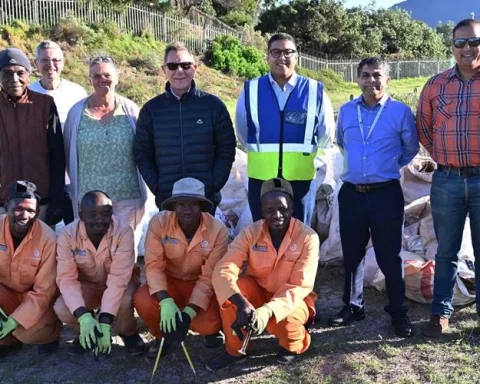South Africa’s artisanal and small-scale mining (ASM) sector shows promise in fueling economic growth, especially for women and youth. The government is implementing progressive initiatives, including the 2022 ASM Policy, funding opportunities for artisanal miners, and a R400 million exploration fund. Collaboration, capacity building, and empowerment are crucial for reshaping the South African mining sector and achieving economic development. The recent Artisanal, Small-Scale, and Emerging Miners Symposium showcased the untapped potential of ASM and the rich mineral resources of Africa, highlighting the critical role that small-scale miners play in the metamorphosis of the South African mining industry.
Can South Africa’s Artisanal and Small-Scale Mining Sector Fuel Economic Growth?
South Africa’s artisanal and small-scale mining (ASM) sector has the potential to catalyze economic acceleration, particularly for women and youth impacted by joblessness, poverty, and inequality. The government is taking progressive initiatives to revolutionize the mining industry, including the 2022 ASM Policy, funding opportunities for artisanal miners, and a R400 million exploration fund. Collaboration, capacity building, and empowerment are key to reshaping the South African mining sector and achieving economic development.
Gathering Insights for Economic Growth
In the expanding arena of artisanal and small-scale mining (ASM), the Artisanal, Small-Scale, and Emerging Miners Symposium in South Africa has become a significant focal point. Prominent dignitaries, including Mintek Board Chairperson, Dr. Thibedi Ramontja, Mintek CEO, Dr. Molefi Motuku, and Deputy Minister Nobuhle Nkabane, were among the attendees. All convened with the common purpose of addressing the obstacles and exploring the capacity of ASM in fuelling South Africa’s economic advancement.
The Deputy Minister emphasized that the national economy is ensnared within a vortex of domestic and global dilemmas. Issues ranging from economic volatility and trade conflicts to power outages and logistical limitations present substantial hindrances. Nonetheless, stakeholders remain dedicated to nurturing the rise of SMMEs, with particular focus on ASM. Inclusive African engagement in this economic sphere is essential, putting artisanal miners and small-scale miners under the limelight.
The prospect of South Africa’s economic progress is intimately connected to the capabilities of ASM and SMMEs. These entities are the vanguards of the nation’s development, set to make substantial contributions. The symposium provided a forum for candid conversations about the sector’s expansion, highlighting the critical role that small-scale miners play in the metamorphosis of the South African mining industry.
Untapped Potential and Rich Resources
Africa’s mineral wealth is beyond dispute, possessing 91% of the world’s Platinum Group Metals (PGMs), 79% of phosphate, 53% of cobalt, 46% of manganese, and 35% of chromite. South Africa’s portion of these resources presents a unique prospect for the country. The nation stands at a juncture where it can harness ASM to catalyze economic acceleration. This initiative aims to reach out to women and youth, communities most impacted by joblessness, poverty, and inequality.
Adopting a broader view, the objective extends beyond mere resource extraction to include value addition and economic expansion. Domestic beneficiation of these minerals has the potential to impede job and profit exportation, keeping these benefits within national boundaries. The South African government, via the Department of Mineral Resources and Energy (DMRE), is taking progressive initiatives to revolutionize the mining industry and enhance its global competitiveness.
Collaborative Efforts and Empowering Policies
In 2022, the DMRE released the Artisanal and Small-Scale Mining (ASM) Policy, underpinned by the principle of stakeholder collaboration. The policy’s aim extends beyond miner training to empowering miners to exploit marginal deposits, often ignored by larger corporations. This collaborative endeavor requires participation from diverse sectors – businesses, communities, government, and state-owned enterprises.
The DMRE spearheaded an initiative to provide funding opportunities for artisanal miners, leading to the inauguration of a financial aid program in 2023/24. Initially planned to support 13 ASM projects, the exceptional response resulted in a shortlist of 21 projects qualifying for funding. Furthermore, a R400 million exploration fund was created to aid in exploration tasks, the unearthing of new mineral deposits, and promoting economic inclusivity.
Building Capacity and Charting the Future
Capacity enhancement and market accessibility stand as the fundamental elements of value extraction from ongoing training programs. The sharing of information and knowledge is promoted, along with the development of skills and human capacity. Through this comprehensive strategy, the DMRE strives to tackle the challenges confronting ASM and reshape the South African mining sector.
In summary, the symposium displayed the proactive measures taken by South Africa to capitalize on its abundant mineral resources. ASM and SMMEs have been singled out as pivotal players in this transformative process. The symposium underscored the significance of collaboration, capacity building, and empowerment, unveiling a renewed emphasis on artisanal and small-scale miners as the country navigates its path of economic development.
What is the potential impact of South Africa’s ASM sector on women and youth?
South Africa’s artisanal and small-scale mining (ASM) sector has the potential to fuel economic growth, particularly for women and youth who are disproportionately impacted by poverty, joblessness, and inequality. The government is implementing progressive initiatives, including the 2022 ASM Policy, funding opportunities for artisanal miners, and a R400 million exploration fund, to empower and support ASM and SMMEs.
What was the Artisanal, Small-Scale, and Emerging Miners Symposium in South Africa?
The Artisanal, Small-Scale, and Emerging Miners Symposium in South Africa was a significant gathering of stakeholders in the ASM sector aimed at exploring the capacity of ASM in fueling South Africa’s economic growth, addressing the obstacles facing the sector, and highlighting the critical role of small-scale miners in the metamorphosis of the South African mining industry. The symposium was attended by prominent dignitaries, including Mintek Board Chairperson, Dr. Thibedi Ramontja, Mintek CEO, Dr. Molefi Motuku, and Deputy Minister Nobuhle Nkabane.
What is the potential of Africa’s mineral resources?
Africa’s mineral resources are vast, possessing 91% of the world’s Platinum Group Metals (PGMs), 79% of phosphate, 53% of cobalt, 46% of manganese, and 35% of chromite. South Africa’s portion of these resources presents a unique opportunity for the country to harness ASM to catalyze economic growth and development.
What progressive initiatives is the South African government taking to revolutionize the mining industry?
The South African government, through the Department of Mineral Resources and Energy (DMRE), is taking progressive initiatives to revolutionize the mining industry and enhance its global competitiveness. These initiatives include the 2022 ASM Policy, funding opportunities for artisanal miners, and a R400 million exploration fund. The ASM Policy is underpinned by stakeholder collaboration, and funding opportunities and exploration funds are aimed at empowering and supporting ASM and SMMEs.
What is the importance of collaboration, capacity building, and empowerment in the ASM sector?
Collaboration, capacity building, and empowerment are crucial for reshaping the South African mining sector and achieving economic development. The ASM sector requires participation from diverse sectors, including businesses, communities, government, and state-owned enterprises, to be successful. The DMRE is spearheading initiatives to build capacity and empower miners to exploit marginal deposits often ignored by larger corporations.
What is the aim of South Africa’s ASM Policy?
The aim of South Africa’s ASM Policy is to empower and support ASM and SMMEs, promoting economic inclusivity and value addition beyond resource extraction. The policy’s principle is stakeholder collaboration, and it seeks to tackle the challenges confronting ASM and reshape the South African mining sector.











